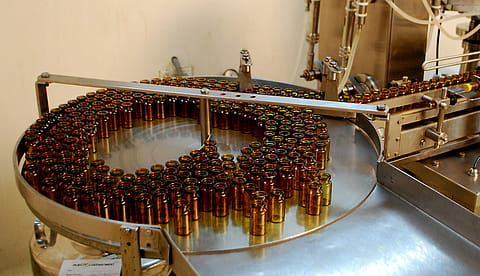55 Indian pharma cos capable of mRNA vaccines
Almost every major Indian pharmaceutical company, including Cipla, Dr Reddy’s, Sun Pharma and Biocon, are on the list of companies which can produce mRNA Covid-19 vaccines

55 pharmaceutical manufacturing companies from India may be fulfilling the technical requirements and quality standards needed to produce mRNA Covid-19 vaccines, and can be approached for collaborations if the license holders of two approved mRNA vaccines—Pfizer-BioNTech and Moderna—wish to bolster the global supply of these vaccines.
In a note, on December 10, by the tricontinental research group ‘AccessIBSA’ and medical NGO Medicines Sans Frontiers (MSF), 120 companies from Asia, Africa and Latin America (55 of them from India alone) have been identified as firms that can be considered capable of mRNA vaccine manufacturing, if the license holders are willing to offer full technology transfer.
The groups clarify that their argument is not based on a theoretical possibility, but as a working model. “Because of the unique nature of mRNA technology, and its lack of cell-based, biological components, mRNA vaccines can be produced by a far larger number of existing pharmaceutical manufacturers, even if these manufacturers have no previous experience with vaccines. This is not a theoretical assumption; it is the working model that Moderna and Pfizer-BioNTech have used to successfully partner with other contract manufacturers to scale up their production”, the analysis says.
According to the authors, Achal Prabhala of AccessIBSA project and Alain Alsalhani of MSF, recent research into requirements for mRNA vaccine manufacturing from MSF and Imperial College reveals that any pharmaceutical company currently manufacturing sterile injectables (a process that requires similar competencies and facilities to those required for making an mRNA vaccine) satisfies the minimum criterion to manufacture an mRNA vaccine. They applied this criterion, and added a stringent quality filter, to identify the manufacturing sites that can potentially be used to produce mRNA vaccines.
Almost every major Indian pharmaceutical company, including Cipla, Dr Reddy’s, Sun Pharma and Biocon, are on the list. The authors, however, say that they had reached out to only one Indian company on the list, Biocon, for feedback.
The civil society groups carried out a baseline scan on pharmaceutical companies from Asia, Africa and Latin America to identify companies, within this geographical scope, who both manufactured sterile injectables, and had been certified by a reputable agency or organization for good manufacturing practices (GMP) as a guarantee of adhering to the highest international quality standards. While their focus has been on technical feasibility, they admit that the companies listed out by them will need to conduct their own ‘gap’ analysis before venturing into mRNA technology. “Not every company in this list of 120 might necessarily want to start making mRNA vaccines—there are multiple factors to take into account, such as the ability to access the required investment, the strength of the drug regulatory authority in the country of manufacture, and, finally, the prospect of a strong business case”, the note reads.